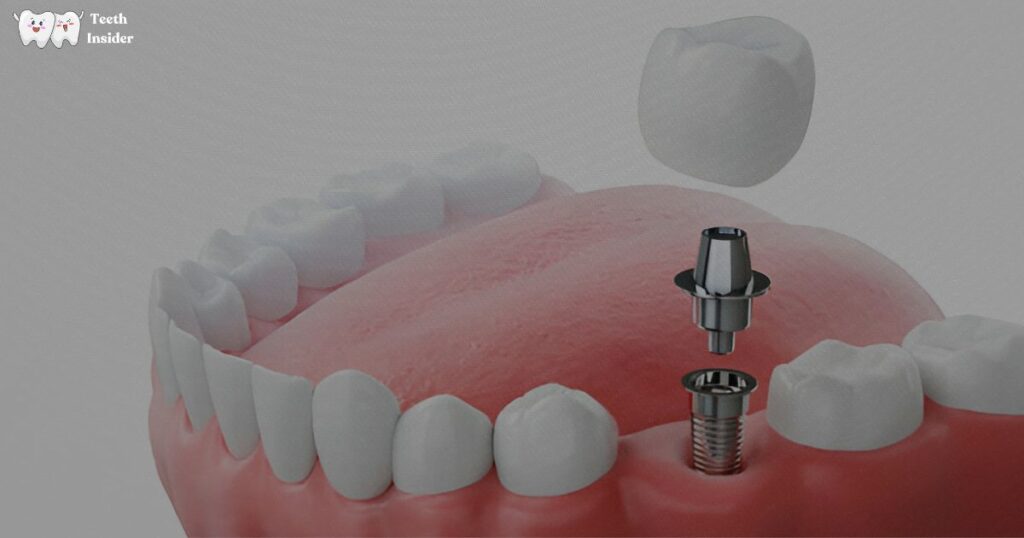Today, in dentistry, dental implants help those with missing teeth. Surgeons place these tiny implants in the jawbone for a natural look and feel. They are a long-term solution that functions like real teeth. This guide explains dental implants. It covers different types, safety measures, risks, surgery, care, and Dental implants cost. Together, let’s set out to explore the realm of dental implants.
Also Read: How Much are Dental Implants?

Comprehending Dental Implants
Fundamentally, a dental implant is a strong substitute for a missing tooth. Skilled surgeons insert implants into the jawbone. They use tools similar to screws. These implants act as strong anchors for crowns, which are replacement teeth. The dental implant and crown are joined by an abutment. The crown is carefully made to match your teeth and look and work like them.
There are several benefits that dental implants have over conventional dentures.
Natural and Comfortable: Implants are designed to fit naturally into your smile, ensuring a comfortable integration.
High Success Rate: Dental implants have a solid track record as a long-term fix.
Enhanced Chewing Function: Enhanced chewing helps you enjoy your favorite foods by making it easier to eat them.
Cavity Protection: Dental implants help prevent cavities in nearby teeth.
Bone Preservation: By keeping the jawbone intact, these implants help stop bone loss.
Reduced Sensitivity: You’ll feel less sensitive to nearby teeth, making your mouth more comfortable.
Convenience: Dental implants are easy to care for. Unlike dentures, they don’t need nightly cleaning or removal.
Also Read: What Are Dental Implants

Types of Dental Implants
There are two main classifications for dental implants:
Endosteal Implants: Doctors commonly use endosteal implants to anchor fake teeth securely in the jawbone.
Subperiosteal Implants: If your surgeon finds your jawbone to be low, they may suggest subperiosteal implants. These implants are put on top of the jawbone.
Security and Qualifications
Dental implant surgery is safe with a skilled and experienced dentist. Dental implants are the only option for helping your jawbone grow and stay healthy. But not everyone might be a good fit for this treatment.
Factors that may hinder eligibility encompass:
It is not recommended to undergo dental implant surgery when you are acutely ill.
Acute Illness: Before getting implant surgery, prioritize your health if you have uncontrolled metabolic diseases.
Bone or Soft Tissue Issues: If you have an infection or disease in your bones or soft tissue, it needs to be treated before you can have surgery.
Habits and Disorders: Some medical conditions like HIV, diabetes, and osteoporosis can affect eligibility. Heavy smoking and teeth-grinding can also have an impact. Behavioral and psychiatric disorders, as well as other habits, may play a role too.
Also Read: When to Take a Pregnancy Test After Implant Removal?
Possible Difficulties
Although generally safe, dental implant surgery has a small risk of complications. These could consist of:
Nerve Damage: In rare cases, changes in sensation in the surgical site may arise from nerve damage.
Incision Reopening: The incision might reopen after surgery.
Movement or Exposure of Implants: Implants may move or show above the gum line.
Infection: An infection may develop around the implant location.
Detecting these symptoms early is important. It can prevent further issues from occurring. If the implant moves or becomes exposed, more treatments may be needed to fix the gums and bone.
Procedures and Additional Considerations
Each person’s dental implant experience is unique and influenced by various factors.
Number of Teeth: An important factor is the quantity of teeth that need to be replaced.
Implant Location: The process is affected by the location of the implant within the jaw.
Bone Quantity and Quality: Both the quantity and quality of bone are crucial at the implant site.
Oral and Systemic Health: Oral and systemic health are connected and affect each other.
For dental implant surgery to be successful, other procedures like ridge modification or sinus augmentation may be necessary.
Upkeep and Extended Medical Attention
Maintaining good dental hygiene is crucial following dental implant surgery. Artificial teeth require routine brushing and flossing, just like natural teeth. Regular check-ups help keep your mouth and dental implants healthy. It is advised to get professional cleanings at the dentist every six months.
The cost of dental implant surgery is subject to several variables:
- Number and Type of Implants: The number and type of implants required impact costs.
- Implant Location: The location of implants within the jaw affects the overall expense.
- Additional Procedures: Any supplementary procedures needed to prepare the mouth for surgery can add to the cost.
Conclusion
Dental implants are a great improvement in dentistry. They offer a strong and lifelike solution for Replacing missing teeth. Not everyone can benefit, but experts can improve your oral health and quality of life. If you’re considering Teeth implants, it’s a good idea to talk to your dentist. They can tell you if you’re eligible and if there are any risks. With proper care, dental implants can restore your teeth. They also boost your confidence, providing long-term benefits and a beautiful smile.
Frequently Asked Questions (FAQs)
What is the lifespan of dental implants?
Dental implants can replace missing teeth. They can last a lifetime with proper care and maintenance.
Is getting implants painful?
To minimize discomfort, dental implant surgery is usually done under local anesthesia. After that, painkillers can be used to treat any discomfort.
Is it possible for anyone to receive dental implants?
We consider factors like health, bone strength, and lifestyle to determine eligibility. See a dentist to find out if you’re a good fit.
Do dental implants need to be maintained differently?
Like natural teeth, implants require routine brushing, flossing, and dental examinations. Six-monthly professional cleanings contribute to their longevity.
What is the price of dental implants?
The quantity of implants and other procedures have an impact on the final cost. A customized estimate can be obtained during a dentist’s initial consultation.

